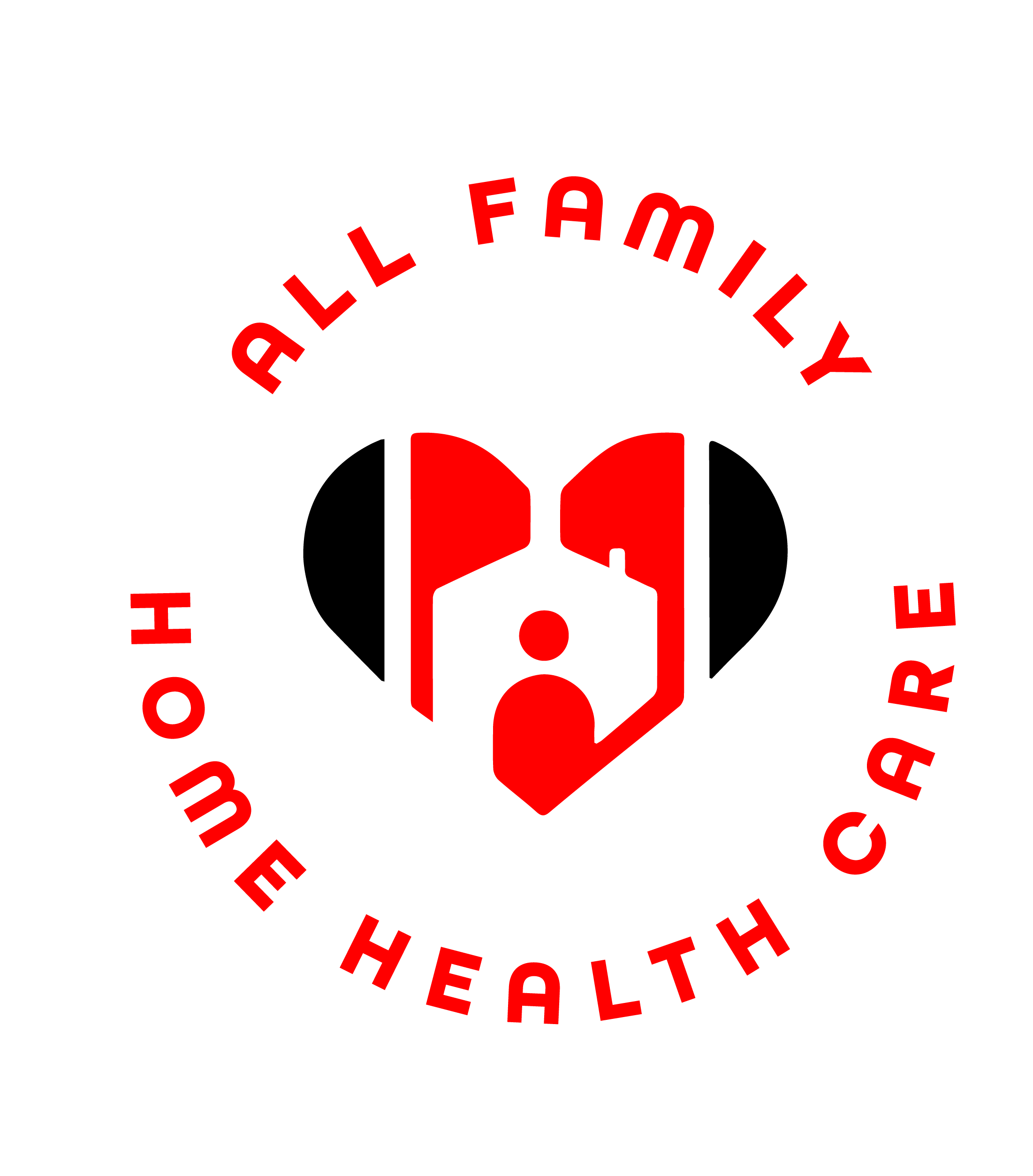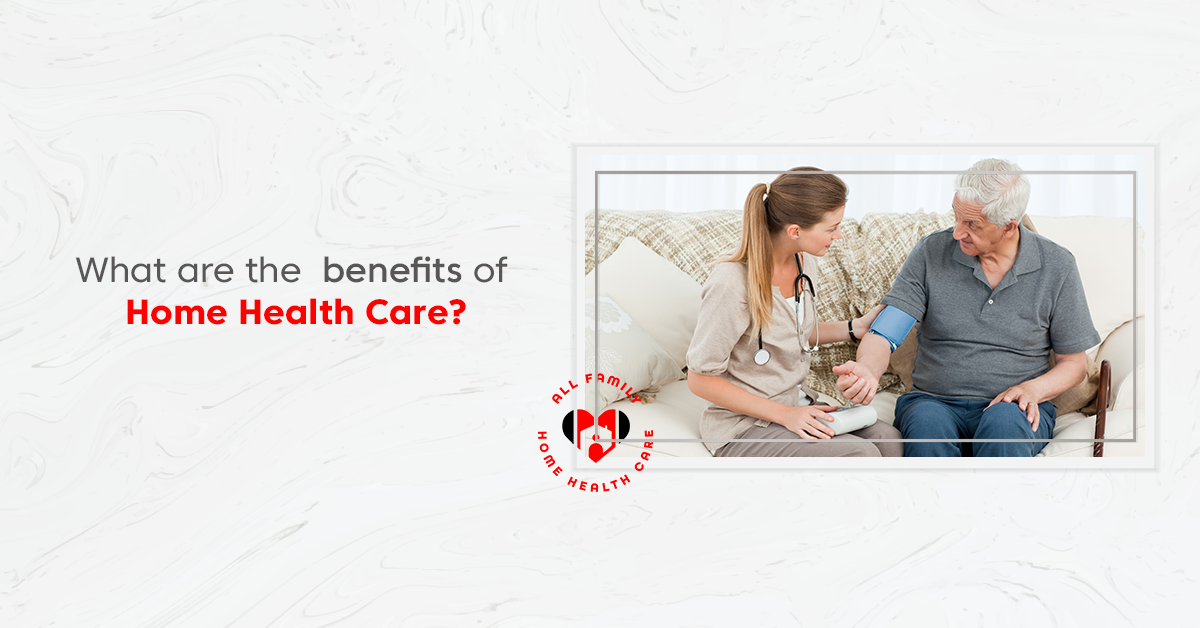A hospital may not be the best place for someone who is sick, recovering from surgery, or needs extra help. Home health care offers medical services, therapy, and daily support at home. People feel safest at home. So, what are the benefits of home health care? Why do families prefer it? Let’s explore how this care helps patients heal quickly, stay independent, and enjoy life. They can do this while being with family, pets, and the comforts of home.
At All Family Home Health Care, we offer caring, personalized services right at home. This approach ensures comfort and respect for seniors. It also gives families peace of mind. Let us help your loved ones thrive in their own space. Contact us today.
Comfort and Familiarity: Healing in a Place You Love
The biggest advantage of home healthcare services is the chance to recover in a familiar space. Picture waking up in your bed. You eat meals at your kitchen table. You listen to your favorite music. For seniors, especially, staying at home for care means less confusion and stress. Research shows that people heal faster when relaxed. Being a patient at home instead of in a hospital can also improve recovery.
- Example: A grandparent with dementia could feel anxious in a hospital. However, at home, with family photos and a routine they know, they might feel more at ease.
- Key Benefit: Less stress = faster healing.
Personalized Care Designed Just for You
Hospitals stick to strict schedules. Home health care and services focus on each patient’s individual needs. Nurses, therapists, or aides make regular visits for personal care. They assist with medications, wound care, and physical therapy. Its main purpose is to focus on your goals.
- Example: A child with disabilities may have speech therapy in their living room. Meanwhile, a cancer patient could receive pain management at home.
- Key Benefit: Care that matches your life, not a hospital’s rules.
Safety First: Fewer Germs, Less Risk
Hospitals are full of germs, and patients with weak immune systems (like seniors) are more likely to get sick there. Care at home for seniors reduces this risk because they’re not exposed to large groups of people. Caregivers also make homes safer by:
- Adding nightlights to prevent falls.
- Organizing medications to avoid mistakes.
- Teaching families how to handle emergencies.
This is why home health care is important—it protects vulnerable people while they recover.
Family Stays Involved and Connected
When a loved one is a patient in home, families can be part of their care. Caregivers show family members how to help safely, like lifting someone from a chair or cooking healthy meals. This teamwork:
- Reduces stress for everyone.
- Let families spend quality time together.
- Avoids long drives to hospitals or facilities.
Example: A daughter can keep working her job while knowing her mom is safe with a caregiver during the day.
Saves Money Compared to Hospital Stays
Another one of the top benefits of home healthcare services is cost savings. Hospital stays are expensive, but care at home cuts costs by:
- Avoiding overnight hospital fees.
- Reducing unnecessary tests or treatments.
- Using insurance or Medicare-covered services.
For long-term recovery, home care is often cheaper than nursing homes.
Faster Recovery and More Independence
Being a patient in home encourages people to take small steps toward independence. Therapists might help someone practice walking in their hallway or climbing stairs they use every day. This practical approach:
- Builds confidence.
- Makes therapy feel relevant.
- Helps seniors stay strong enough to live alone longer.
This focus on independence is a key purpose of home health care.
Emotional Support: Fighting Loneliness
Many seniors feel lonely after hospital stays, which can slow healing. Care at home for seniors includes companionship and emotional support. Caregivers might:
- Play card games or watch movies with patients.
- Help write letters to family.
- Listen to stories about their life.
This human connection is why home health care is important—it heals the heart, not just the body.
Flexible Care That Changes with You
Home health care and services adapt as patients get better or face new challenges. For example:
- After surgery, daily nurse visits might shift to weekly check-ins.
- A caregiver could help with bathing now and grocery shopping later.
- Therapy might focus on walking first, then cooking or dressing.
This flexibility ensures care always matches the patient’s needs.
Helps Manage Chronic Illnesses
For people with diabetes, heart disease, or COPD, home health care provides ongoing support. Nurses can:
- Teach patients to check blood sugar or use oxygen.
- Monitor symptoms to prevent emergencies.
- Coordinate with doctors to adjust treatments.
This proactive care keeps chronic conditions under control and avoids hospital trips.
Peace of Mind for Families
Knowing a trained professional is checking on a loved one brings huge relief. Care at home for seniors means families don’t have to worry about:
- Missed medications.
- Forgotten doctor’s appointments.
- Safety hazards like loose rugs or poor lighting.
Example: A son living far away can relax knowing his dad’s caregiver updates him daily.
Support with Daily Activities
Home health care and services go beyond medical help. They also assist with daily tasks such as:
- Bathing, dressing, and grooming.
- Cooking meals that meet dietary needs.
- Light housekeeping or laundry.
This assistance lets patients focus on getting stronger instead of daily chores.
Technology Makes Home Care Even Better
Today’s home health care uses tools to keep patients safe:
- Video calls with doctors (telehealth).
- Medical alert buttons for emergencies.
- Apps to track medications or vital signs.
These tools are especially helpful for rural families or those with busy schedules.
How to Start Home Health Care: A Simple Guide
- Talk to a Doctor: They’ll confirm if home care is safe and write a plan.
- Find a Trusted Agency: Look for licensed providers with good reviews.
- Plan Together: Discuss schedules, costs, and goals with the care team.
- Stay Involved: Ask questions and share updates to keep care on track.
Final Thoughts: Why Choose Home Health Care?
What are the benefits of home health care? It provides personalized medical care along with emotional support. Healing flows through the mind, body, and spirit like a gentle stream. Home care is vital for seniors. It helps them stay independent and active in their community. For families, it brings a wave of relief and joyful moments. Home health care offers a caring, flexible solution. It supports those recovering from injuries, managing illnesses, or needing daily help. This approach truly prioritizes people.
FAQs
Can family members help with home health care?
Absolutely! Families work with caregivers to learn skills like safe lifting or meal prep. Teamwork makes home health care important. It keeps loved ones connected and involved.
How does home health care help with loneliness?
Caregivers provide companionship and emotional support. They engage in conversations, play games, and enjoy hobbies together.



No comment